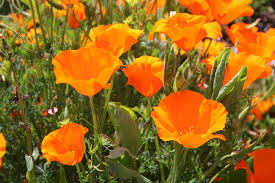
Spiritual Sunday
We are currently in the middle of Hanukkah, the Jewish Festival of Lights (Dec. 10-18 this year). While I won’t contend that Mary Oliver’s “Poppies” is a Hanukkah poem, it features Hanukkah sentiments when it says that light
is an invitation to happiness, and that happiness, when it’s done right, is a kind of holiness, palpable and redemptive.
In her poetry, Oliver never underestimates the power of darkness, described at one point in “Poppies” as a “cold, black, curved blade” that nothing can stop. The last stanza reminds me of an e.e. cummings poem that also pits darkness against the vibrancy of life while concluding with a defiant challenge. In “Buffalo Bill’s defunct” cummings asks,
and what i want to know is how do you like your blue-eyed boy Mister Death
Oliver, meanwhile, concludes,
and what are you going to do—
what can you do
about it—
deep, blue night?
“Not much” seems to be the implied answer. Or as the evangelist John puts it, “And the light shineth in darkness; and the darkness comprehended it not. Here’s the poem:
The poppies send up their
orange flares; swaying
in the wind, their congregations
are a levitation
of bright dust, of thin
and lacy leaves.
There isn't a place
in this world that doesn't
sooner or later drown
in the indigos of darkness,
but now, for a while,
the roughage
shines like a miracle
as it floats above everything
with its yellow hair.
Of course nothing stops the cold,
black, curved blade
from hooking forward—
of course
loss is the great lesson.
But I also say this: that light
is an invitation
to happiness,
and that happiness,
when it's done right,
is a kind of holiness,
palpable and redemptive.
Inside the bright fields,
touched by their rough and spongy gold,
I am washed and washed
in the river
of earthly delight—
and what are you going to do—
what can you do
about it—
deep, blue night?
By uniting an image of baptism with an allusion to earthly delight, incidentally, Oliver connects spiritual transcendence with sensual pleasure. She may have in mind Hieronymus Bosch’s “Garden of Earthly Delights,” a triptych whose first and perhaps second panel celebrate such pleasure. Oliver regularly uses sensual ecstasy as a means of connecting with the divine, whether through poppies, honey, lightning humpbacked whales, blackberries, or countless other natural phenomena.